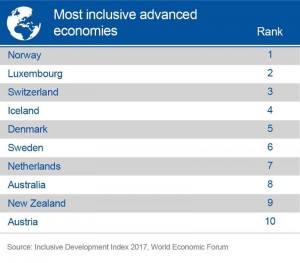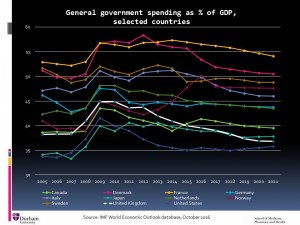‘GDP is an abstraction that has little personal meaning for individuals’ - Richard Easterlin, professor of economics , University of Southern California
by Daniele Dionisio
Membro, European Parliament Working Group on Innovation, Access to Medicines and Poverty-Related Diseases
Responsabile del Progetto Policies for Equitable Access to Health – PEAH
Oltre il PIL per la Misura del Benessere Globale
Il successo del PIL (Prodotto Interno Lordo, GDP in lingua inglese), quale abusato indice di misura del benessere nazionale, non accenna a diminuire. Una fissazione che persiste sebbene evidenze e fonti autorevoli ne denuncino l’insufficienza come indicatore di progresso. Il Nobel economista Joseph Stiglitz ha affermato che il PIL non è una buona misura di performance economica né di benessere. E secondo un altro economista, Jennifer Blanke, ‘…it merely provides a measure of the final goods and services produced in an economy over a given period, without any attention to what is produced, how it’s produced or who is producing it.’ Blanke pone una domanda chiave trascurata dal PIL: è la crescita equa, rispettosa dell’ambiente, e migliorativa delle nostre vite?
In effetti, qual è la giusta direzione per un’economia moderna e inclusiva? Senza dubbio che essa dovrebbe impegnarsi a soddisfare le necessità di base di ognuno, principalmente in termini di salute e serenità di vita. E che dovrebbe anche evitare di immagazzinare ogni potenziale fonte di danno di lungo termine, estrema diseguaglianza e collasso ambientale inclusi.
Nel contempo, l’economista Richard Easterlin, ha definito il PIL ‘an abstraction that has little personal meaning for individuals’. E Joseph Stiglitz incalza ‘Ciò che misuriamo informa ciò che facciamo. E se misuriamo la cosa sbagliata, noi faremo la cosa sbagliata’.
In tal senso, secondo Jennifer Blanke, il PIL è solo una misura parziale di breve termine, mentre il mondo ha bisogno di strumenti di fiducia e di più larghe vedute per informare il modo in cui costruire le economie del futuro.
Al riguardo, dati presentati al World Economic Forum (WEF) del gennaio 2017 mostrano che sebbene il PIL di buona parte delle economie avanzate indichi una crescita annuale di circa il 2% nel 2016, in realtà il reddito medio pro-capite in 26 nazioni ricche è caduto del 2,4%. Il dato non stupisce se è vero che oggi masse di poveri vivono in aree dove maggiore benessere coesiste con sacche di maggiore diseguaglianza per l’incapacità dei governi a trasferire la crescita economica entro un ampio ed equo progresso sociale.
Per l’occasione il WEF ha lanciato l’Inclusive Development Index – IDI, un indicatore più completo e inclusivo del PIL, per la misurazione del benessere globale. L’IDI associa ai consueti indicatori economici, criteri più ampi tra i quali la disparità nei redditi e nelle ricchezze, la mobilità sociale, la qualità della vita e dell’ambiente, la sicurezza. In base all’IDI la Norvegia si conferma ancora la più virtuosa fra i Paesi avanzati: con una crescita economica solo dello 0,5% tra 2008 e 2013, lo standard di vita è in realtà cresciuto del 10,6%. Lussemburgo, Svizzera, Islanda e Danimarca seguono a ruota (Figura).
Gli Stati Uniti, invece, si collocano al 23mo posto, peggio di Estonia, Repubblica Ceca e Corea del Sud.
L’Italia, ventunesima su trenta economie avanzate per PIL pro-capite, scende al ventisettesimo posto (su 29) nella classifica IDI. Secondo il rapporto WEF l’Italia paga il ritardo sulla crescita, sul lavoro e sui giovani mentre il sistema di protezione sociale non affronta questi problemi con la dovuta efficienza.
L’IDI è solo l’ultimo, in ordine cronologico, di una serie di indicatori inclusivi proposti per il superamento del PIL in termini sociali, economici e ambientali. Tra essi, l’ Human Development Index (HDI), lanciato dalle Nazioni Unite e focalizzato, fra l’altro, al monitoraggio di qualità e attese di vita, educazione e redditualità pro-capite; il Social Progress Index con enfasi sul benessere sociale e ambientale; e il World Happiness Index inclusivo di ‘measures of generosity, freedom and corruption’.
Nel frattempo, la New Economics Foundation (NEF) proponeva 5 indicatori in un report dell’ ottobre 2015: buona occupazione lavorativa, benessere, ambiente, equità, e salute. Giusto ad esempio il report sottolineava, fra l’altro, come a fronte di un 94% di cittadini inglesi ufficialmente al lavoro nel 2014, solo il 61% godeva di posti sicuri e remunerativamente soddisfacenti. E, con riguardo alla salute, proponeva la misura delle ‘morti evitabili’ quale indice della qualità degli interventi e dei livelli di prevenzione.
Senza dimenticare, una volta ‘rodato’ e implementato, il potenziale impatto nella realtà italiana del BES, l’indice di Benessere Equo e Sostenibile sviluppato da ISTAT e CNEL per valutare il progresso di una società non solo dal punto di vista economico ma pure sociale e ambientale, e corredato da misure di disuguaglianza e sostenibilità. I 12 indicatori del BES includono, fra gli altri, la salute, l’istruzione e la formazione, il lavoro e il benessere economico, il benessere soggettivo, l’ambiente, la qualità dei servizi.
Il 28 luglio 2016 il BES è entrato nel Bilancio dello Stato al fine di rendere misurabile la qualità della vita e valutare l’effetto delle politiche pubbliche su alcune dimensioni sociali fondamentali.
PER APPROFONDIRE
This might be the best alternative yet to GDP as a way to measure a country’s growth https://qz.com/885723/this-might-be-the-best-alternative-yet-to-gdp-as-a-way-to-measure-a-countrys-growth/
Beyond GDP – is it time to rethink the way we measure growth?https://www.weforum.org/agenda/2016/04/beyond-gdp-is-it-time-to-rethink-the-way-we-measure-growth/
Five measures of growth that are better than GDP https://www.weforum.org/agenda/2016/04/five-measures-of-growth-that-are-better-than-gdp/
The Inclusive Growth and Development Report 2017 WEF http://www3.weforum.org/docs/WEF_Forum_IncGrwth_2017.pdf
Inclusive Development Index: Measuring What Matters http://impactalpha.com/inclusive-development-index-measuring-what-matters/
Human Development Index http://hdr.undp.org/en/content/human-development-index-hdi
Social Progress Index http://www.socialprogressimperative.org/global-index/
World Happiness Index http://worldhappiness.report/
Rapporto Bes 2016: il benessere equo e sostenibile in Italia https://www.istat.it/it/archivio/194029







